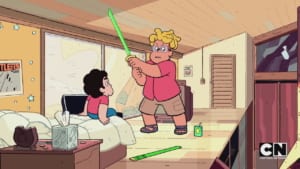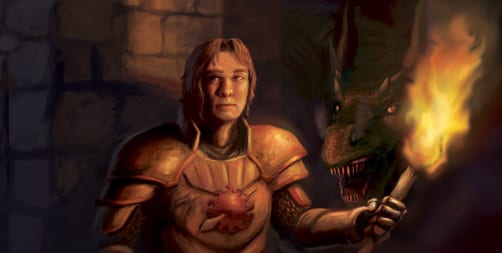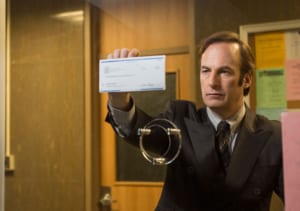Anyone active in a television fandom these days knows the argument about filler. You seemingly can’t escape it anymore. Slow episode? Filler. Side character gets unexpected focus? Filler. Plot takes an unexpected turn towards something unrelated to the rest of the season? Filler. These debates often turn nasty and grow into monsters making fandoms unappealing to deal with. Most of the time, you find they can’t even agree on what filler truly is.
Fans these days increasingly seem to focus on what makes an episode or chapter or even a season qualify as filler. It is the go-to criticism for many unsatisfied with their media. So what exactly is filler? Is it such a bad thing? At what point does filler take away from a show?
We should start by examining what filler is.
The trope definition of filler is “entries in a generally continuous serial that are unrelated to the main plot, don’t significantly alter the relations between the characters, and generally serve only to take up space”. Basically, those episodes clearly there just to fill time and pad out a season, where no character changes, no plot movement occurs, and you could pluck it out of the show without any effect.
Anyone who watches dramas on network TV knows exactly what this definition refers to. When a show has 20+ episodes in a season, filler is inevitable simply for budget and storytelling reasons. It’s how The Last Airbender ends up with “The Great Divide” and how Lost ends up with the Nikki and Paulo episode. It’s why Supergirl has alien-of-the-week episodes. While disliked, filler was accepted as necessary because every show had 20+ episodes, and some of them would be unimportant.

Then the best thing to ever happen to TV came along: prestige dramas. Concentrated doses of 10-13 episodes where every episode mattered. Showrunners came along with increasingly well-plotted ideas of where their show would begin and where it would end, with seasons that drove the story ever forward towards those ends. Filler was nonexistent with these shows. There was simply no time for them.
You’d think the filler argument would also dwindle away. Yet, somehow, the filler arguments became more intensive than ever. Why? I think the reason stems in a misunderstanding of what filler is, and how fan expectations cause them to punish and criticize an unfinished or unexpected product.
What Isn’t Filler
We’ve all seen this at some point. Fans have an idea in their minds of what a show is about and where a season will head. Any deviation from the singular focus they have in mind will be called “filler” and dismissed as a disappointment. There’s no patience to see how the episode fits into the overall themes, plot, and structure of the season’s self-contained plotline, or the show as a whole.
One of the best examples of calling an unfinished storyline “filler” comes with season 4 of Steven Universe. Now I know we love this show around here and might be willing to accept slower episodes than others will. And I won’t pretend Steven Universe’s 4th season rocketed forward at a fast pace. Rebecca Sugar and her Crewniverse clearly made a decision to move slowly and deliberately. However, fan expectations played a huge role in the eventual filler accusations, all the while completely ignoring how these episodes served to build up the season-ending Steven Bomb.
After the introduction of one of the show’s main antagonists near the beginning of the season, people expected a plot involving the attack of those antagonists on Earth. Instead the season slowed down and focused more on the various human residents of Beach City, Steven’s hometown. People quickly grew frustrated when episodes like “The New Crystal Gems” focused on silliness rather than having Peridot, Lapis, and Connie teaming to fight something, as many expected of the episode. Neither did it help when Cartoon Network teased a “new gem” ahead of “Rocknaldo”, which just turned out to be a much-disliked character taking a gem name for himself. By the time the ending Steven Bomb rolled around, fans had begun to turn on the show for spewing out filler instead.

Only when the antagonists finally made their move, most of those “filler” episodes were proven to have a point to the overarching story. Many episodes previously considered unimportant held a new significance. Even episodes like “Onion Gang” suddenly mattered. The emotional impact of the final Steven Bomb was increased greatly for their inclusion. Would you have cared so much about the abduction of Steven’s friends without the episodes focused on them?
I haven’t even gotten into the importance of the humans and Beach City to the show and Steven’s identity, and how this importance fed into the season’s final scene.
Often it seems people channel their frustration about prioritizing character over plot into accusations of filler. Season 5 of The Americans faced these same accusations. Yes, it moved slow and stalled the plot significantly. However, the character development was substantial. Just as it was with Gloria’s California episode in Fargo, which fans also criticized and dismissed as filler.
Remember the whole altering relations between characters part of the filler definition?
There’s also the issue of audience expectation I mentioned earlier. Yes, we all suspected and hoped to see Lapis, Peridot, and Connie fight corrupted gems or some Homeworld scouting force when “The New Crystal Gems” aired. Just because it did not happen does not make the episode filler. Not when the dynamics between the characters was altered significantly. Neither can we dismiss as filler storylines which have not ended. Just because the Mischa storyline did not completely blow up the Jennings family in The Americans does not mean his storyline was filler. Not until we see how it finishes.
I’d think fans of that show in particular would be patient considering how Nina’s time in a Soviet prison saw the same backlash, yet came back to matter.
When Filler Is and Is Not Okay
Of course, I do not mean to dismiss all complaints of filler as wrong or misunderstood. Sometimes a story just has plain filler. As I mentioned earlier, it’s inevitable when you have to fill a certain amount of episodes of a show or issues of a comic or manga. I think most fans will accept filler for this reason. When does this acceptance run out? When does filler push fans to dissent?
One of the best examples of this uncertain border I can think of occurs with the A Song of Ice and Fire series. Specifically, the latest two books of the series, A Feast for Crows and A Dance with Dragons. These books are controversial among the fans for many reasons, and opinions vary wildly about their quality. A substantial area of disagreement about them involves how much of the books are filler, and how acceptable (or not) that filler is.
As much as I love these books, and especially Feast (of which I’m far from alone), they do feature a lot of content that can be interpreted as filler. We meet new characters of uncertain importance. Characters travel a lot. History lessons occur left and right. In some cases, such as Quentyn Martell’s chapters in Dance, people questioned whether an entire character’s existence was filler.

Considering they were meant to be one book and bloated into two, those accusations certainly hold merit. I can think of plenty of repeated material and dragging passages (especially in Dance) that feel totally unnecessary. I don’t mean to suggest they hold no value or meaning to the themes of the books or journeys of the characters, but so much of these books repeats information to the point of wondering why. Did this really need to happen, especially when one book became two and the second was forced to cut out the ending battles resolving two of its major conflicts? Did we really need 3 instances in a single chapter of Tyrion eating, sleeping, and hearing a history lesson from Illyrio?
Hence the source of disagreement. Just how much of the filler in these books was engaging for you to overlook? How necessary do you think the new characters will be to the story? How much time did Martin really need to spend on the aftermath of the war? Speaking for myself, I will defend Feast forever. I think it hits the perfect amount of world and character-building serving the larger themes of the novel without ever taking away from my enjoyment. What parts might drag are more than made up for by their fit in the themes of the story and journeys of the characters.
On the other hand, I think Dance spills over into pure filler. Others will disagree with me. They may prefer filler with the series’ main characters over filler with new characters they don’t care about and consider unimportant. My earlier mention of fan expectation plays a large part here as well. If you don’t think Arianne, Aegon, or the Greyjoys will actually matter to anything, you will hate their characters. If you think they will, you will probably at least feel interested.
And so an argument is born.
A similar, but different argument exists with Steven Universe. Most fans understand that, as a kids show, it will have life lesson episodes serving no practical purpose to the plot or characters. What’s the balance? How many “Rocknaldo” or “Buddy’s Book” type episodes will you accept before you consider them excessive? Or to flip over to a drama, how much stalling could Mr. Robot get away with before revealing its secrets? Did the creators time things right or go too far?
The type of show will also matter. A slower show often focusing on characters, like The Americans or The Leftovers, can get away with episodes considered “filler” without upsetting the audience more than a show like Game of Thrones can. (And yet…)
This leads to arguments between fandoms about filler and the quality of their shows. Let’s just say that’s a different kind of unpleasantness I try to avoid these days, and an unpleasantness leading me to my final point.
Why Does Filler Matter So Much?
At what point did we start boiling media down to a series of plot points? So often people just want to rush from revelation to revelation, from big moment to big moment, and anything standing in the way of those revelations and moments causes frustration. The journey comes second to the end destination, and everything on screen is judged by its importance to that end destination.
Why? Why did we start treating stories like blueprints, where efficiency matters above all else and unnecessary materials must be discarded? At what point did stories become math formulas to solve rather than experiences, beautiful new worlds mirroring our own we lose ourselves in?
Arguably the best example in recent years of this obsession with an endpoint (well, outside of Game of Thrones adaptation choices) occurred with Better Call Saul. We knew so little about the show going in. Rumors pegged it as a comedy, then a dark comedy like the first season of Breaking Bad. We weren’t sure what the time period it would start or end in. The only thing we knew for sure was the eventual emergence of Saul Goodman. That was the pitch after all; watch the birth of Saul Goodman.

When the show began, fans judged every episode by this singular inevitability. Did this episode move Jimmy McGill closer to becoming Saul Goodman? As the show developed and we realized the deeper, prolonged arc developing alongside it, dissatisfaction grew. Why are we spending so much time on Jimmy being Jimmy? Who cares about his brother? Who cares about this new law firm Jimmy joined? We want Saul! Anything less was “filler” standing in the way.
The journey never mattered. Only the final destination. In their impatience, fans overlooked that all this “stalling” beforehand was a vital part of how Saul Goodman came to exist. The silly suit montages and second law-firms and photocopy schemes had to happen.
Thankfully, the recently-ended third season finally saw people come around to the journey of Jimmy to Saul. Fans dread the day Jimmy vanishes forever. But why did they dread it to begin with? Why did this endpoint matter so much more than the question of how it occurs?
I know everyone is different and consumes their media in the way they prefer. There’s nothing better about the way I enjoy a TV show, book, or comic than anyone else. Everyone will have their own opinion on filler. And believe me, I’m not questioning why people want to see the big plot points so badly. We don’t remember Breaking Bad for the fourth time a meth cook went right, they remember the times a cook went horribly wrong. We don’t use “Cat Fingers” to sell Steven Universe, we use “Jailbreak” or “The Trial”.
I just wonder when we decided those moments were the only thing that mattered.
Filler often makes for fantastic TV. Sometimes a self-contained story separate from the overarching story makes for some of the best parts of a property. “Tales from Ba Sing Se” may be a distraction from the rising action of The Last Airbender’s second season, but it provides one of the most memorable moments in the entire series. I can think of plenty of “filler” lesson episodes of Steven Universe ranking among my very favorites in the series. Same with the “villain of the week” shows like Supergirl.
Of course, as I mentioned earlier, all those shows will be forgiven for filler more easily than a prestige drama like Better Call Saul. You walk into one knowing filler is inevitable, while with the other it is not.
From what I can tell, the filler debate is going nowhere. In this age of increasingly high-quality media, where so many choices provide so many compelling stories, a topic like filler will always be used in the comparisons and arguments over these many options. Speaking for myself, I hope we can remember what filler really is, why it exists, and why it isn’t always such a bad thing.

